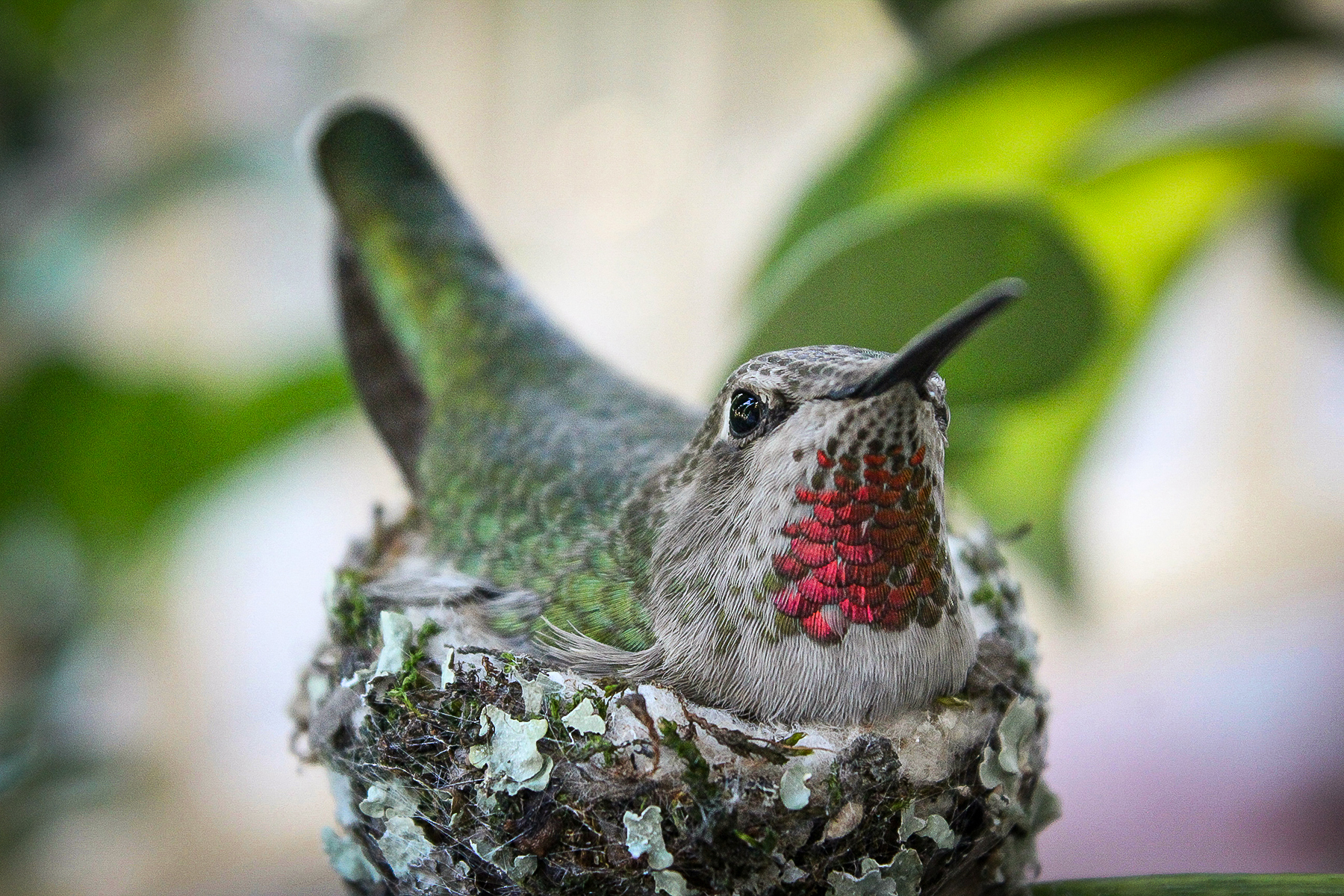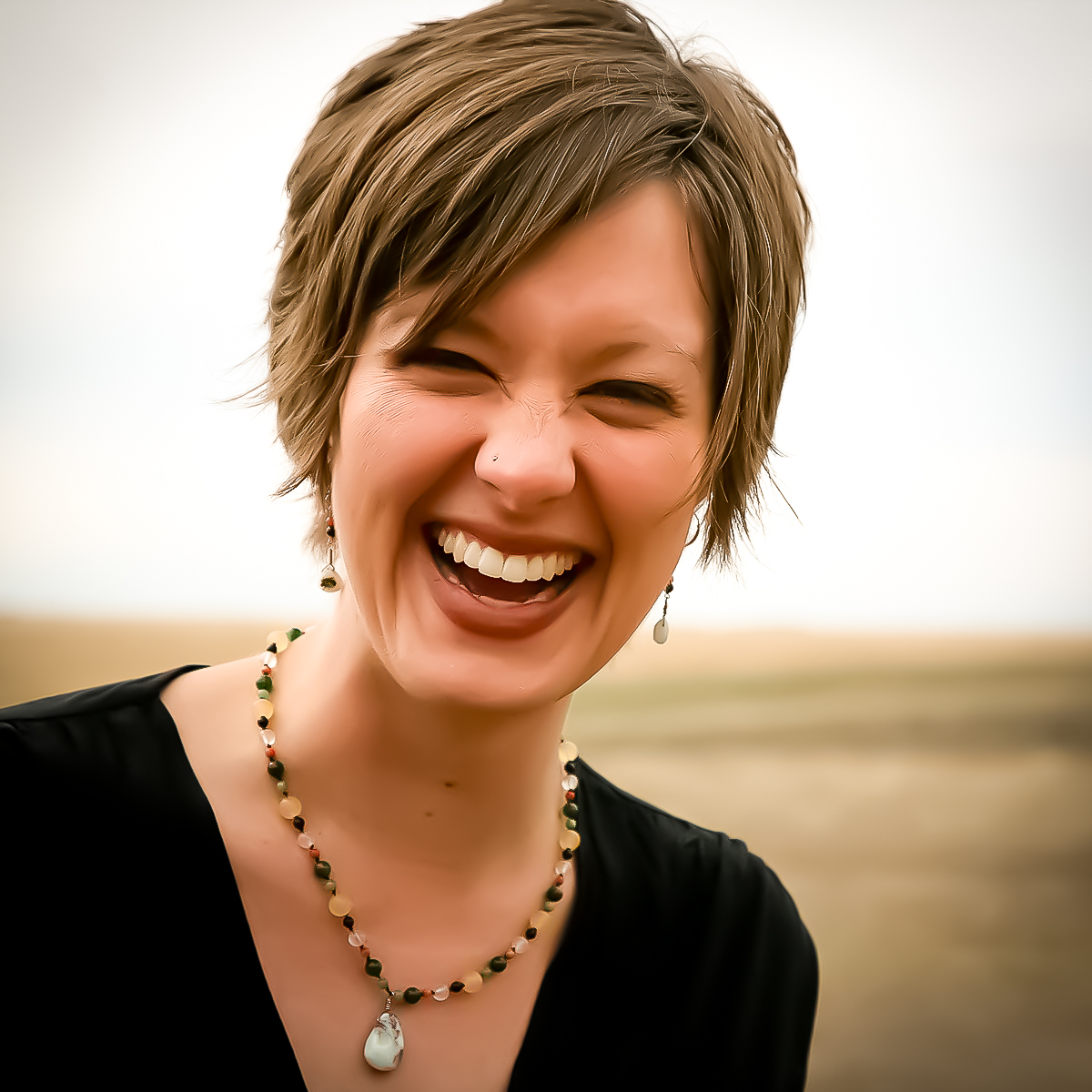The Cultivating Poetry column will explore both the writing and reading of poetry, and the practical ways this intersects with how our souls are formed. We will consider a range of poets, both contemporary and historical, looking for their invitation to us to see differently, to inhabit the world, together finding courage to live as a poeima in this beautiful, terrible world we have been given.
![]()
Weeks ago, in the long twilight of a June evening, my son found a hummingbird’s nest. It was balanced at the fork of a low branch in our blue spruce, tucked deep into the rough needles. Each time I have looked since then, the hummingbird is at rest, still but for the faint rise and fall of her breast. Her black beak is a needle, sometimes pointed east, other times west, always lifted toward the outside world. Eyes watch without blinking, glittering black.
Go, go, go, said the bird: human kind
Cannot bear very much reality. (Burnt Norton, lines 42-43) [1]
It is morning, and I hold a mug of hot tea, drink in the sunlight on my front porch. I see the hummingbird launch herself from branch to sky, up, up and away from her nest. Eyes still blinking away sleep, I walk over to peek into the nest, hoping to see the eggs she works so hard to keep warm. I lift the overhanging branch, which overshadows the nest like a wing. Inside: tiny feathers, fragments of shell, a tiny bird body, skin bare, still. The hum of mother wings sings her return; I retreat.
The stillness of the new bird body squeezes my lungs as I stand barefoot on the steps. My throat is tight, heartbeat moving toward hummingbird’s tempo. My cheeks are wet, and why? It is more than sadness. There is anger. The vulnerability of this new life has caught my morning heart unguarded. I don’t know whether the tiny bird is dead or alive and I’m tired of death, tired of small things crushed, of longings scraped raw by time, and my tender heart wails before a God who does not meet power with power.
In my beginning is my end. (East Coker, line 1) [2]
When I was a child, I relished the days when we were allowed to upend the neatness of the family room, pulling couch cushions and blankets, cardboard boxes and card tables into the magical form of a fort. I would calculate the ratio of blankets and cushions for tunnels and walls. The nest I made needed to be sheltered, tucked deep into the maze of chair legs, beneath the table, secure. Then I heard the Psalmist call God a fortress, a strong tower, a deliverer, a rock in whom refuge is found, and that hunger for shelter was named.
In my end is my beginning. (East Coker, line 209) [3]
Each poiema—you and me and the person who will vote for the thing each of us fears—is being written into days filled with uncertainty. Days filled with dark cold and empty desolation. Days filled with fragile beauty that will break us open, if we’re not careful. This is nothing new. There is nothing new. We are nothing new under the sun. “Human kind / cannot bear very much reality.”
It is before dawn, sky barely lightening, streetlights burning bright. The nest blends into the branches, and I’m awake, standing barefoot outside as the world slides toward day. In the Hebrew Bible, the word malakh is translated most often as angel, but it can also mean messenger. Here I stand again, watching the nest, peeking into a blue spruce sometimes alive with birdsong: finches and jays, robins and magpies and a host of feathered messengers singing me outside of myself, welcoming me into the present with a God whose laughter bursts open with the snapdragons reseeded from last year’s crop.
And so each venture
Is a new beginning, a raid on the inarticulate
With shabby equipment always deteriorating
In the general mess of imprecision of feeling, (East Coker, line 178-181) [4]
Agnes Sanford, in her spiritual biography Sealed Orders, speaks of her father’s mental breakdown and its impact on her childhood. “Looking back now from the vantage point of many years, I can see a cause that they never saw: He was doing the work of the Holy Spirit without the full power of the Holy Spirit.” [5] In the New Testament, the Holy Ghost comes like a wind, like tongues of fire, is named the Spirit of Comfort. Jesus told His disciples that it is better for them—better?!—that He go away, because when He goes, He will send the Holy Spirit. The same Ruach—Spirit—who hovered over the uncreated creation before the beginning, who has been poured out to make a home in anyone who believes.
My first sentence found voice before I could walk, holding the balusters on my grandparents’ small second-floor patio: “Mama, come see geese.” My voice, lifted in a call inviting those near me to come outside themselves, to witness what held my fascination. Years later, I learned that the Celtic picture of the Holy Spirit was not a dove, but a wild goose, passionate, willful, unpredictable. Never mind the unattending grownups with their sentiments about geese being a dirty nuisance, their hands full of playing cards, game show applause erupting in the background.
Love is most nearly itself
When here and now cease to matter.
Old men ought to be explorers
Here and there does not matter
We must be still and still moving
Into another intensity
For a further union, a deeper communion
Through the dark cold and the empty desolation (East Coker, lines 200-207) [6]
In days of desolation, it is all too much. I must be tucked deep into a strength that isn’t my own, overshadowed and undergirded. Held. To learn that this is a real place, to know it is a place where I might return. Must return. But knowing is so much more than mental assent. I must learn to know this in the embodied places where abandonment and shame have shackled me. I must name the griefs that have held me hostage so that I am free to be hidden in Love.
What if this breaking and breaking of my heart, like a hummingbird’s egg, is what’s keeping me alive? An ongoing invitation to receive the life I have been given, to let the bitterness of the pain I name before God become a place of holy wrestling in which I am named? What if I receive each new beginning as an invitation to wake up to this life, to the birthing and breaking, the beauty and brutality that grabs hold of me and won’t let me go? It takes my breath away, and then I’m gasping; my lungs are filled. I breathe into the Real.
With the drawing of this Love and the voice of this Calling
We shall not cease from exploration
And the end of all our exploring
Will be to arrive where we started
And know the place for the first time. (Little Gidding, lines 238-242) [7]
I pick up my pen, squiggle circles until I’m sure it’s not just dry but empty, out of ink; I fill it again. There is no way to measure the ripples that each stone I throw into the pond of this world can make. I feel the familiar pull to know, to measure, to control. But this is not living. I know this small place well, and do not flourish here. Instead, I remember that I might welcome my own emptiness, be filled each day by something that is not me. It is here, in this possibility of writing—and living—from the invisible reality that I am overshadowed and indwelt. My fingers are smeared with ink, and I hold my pen, lay down my words, even as the voices that descry the economic viability of poetry echo in my mind. To own my voice and speak into the conversation, to let myself be written as I do, becomes an act of war. My fort, my Fortress, becomes my source of fortitude.
When I write, I choose to stand in the line with the ones who fall and get back up again, again, again, to be one whose righteousness comes in my rising, not in the absence of my falling [8]. If, as the first Psalm says, I am like a tree, I must grow outward even as I root downward. And as I move up and out, I simultaneously send my roots into the darkness. Is it then accidental that the neural pathways of my brain and the bronchioles and alveoli in my lungs resemble both roots and branches?
It is raining when I check the nest again, still full of mother bird, and so I know her young one is tucked beneath her. I feel the fierce tenderness of being, surrender today to the breaking that begets becoming. Wild geese will stitch the Colorado sky into winter soon; hummingbirds will fly south. But the Wild Goose is here, nesting with the hummingbird, welcoming me to speak my voice into the emptiness, to practice being filled.
![]()
[1] T.S. Eliot, Four Quartets. (Mariner Books, Houghton Mifflin Harcourt, 1971).
[2] Ibid
[3] Ibid
[4] Ibid
[5] Agnes Sanford, Sealed Orders: Her Spiritual Autobiography. (Bridge-Logos, 1972).
[6] T.S. Eliot, Four Quartets.
[7] Ibid
[8] Proverbs 24:16
The featured image is courtesy of Malachi Diaz via Unsplash. We are grateful for his generosity.
Amy Malskeit is a lover of words and stories and people. She holds an undergraduate degree in English and Spanish, a secondary English teaching credential, and an MA in creative writing with an emphasis in poetry from Lancaster University in Northwest England. Her years teaching middle and high school gave her a love for middle grade and young adult literature, and the awkward awesome that being a young adult means. She is a mother of two who plants her garden and makes her home in the foothills southwest of Denver with her best friend, Kevin. She loves the water, and feels most at home when she is near the Pacific Ocean. She reads broadly, and is passionate about exploring big questions and small moments through her poetry, essays, and stories.
Leave a Reply
A Field Guide to Cultivating ~ Essentials to Cultivating a Whole Life, Rooted in Christ, and Flourishing in Fellowship
Enjoy our gift to you as our Welcome to Cultivating! Discover the purpose of The Cultivating Project, and how you might find a "What, you too?" experience here with this fellowship of makers!


Add a comment
0 Comments